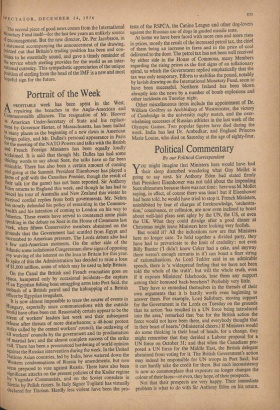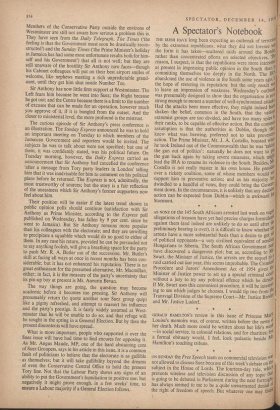Political Commentary
By our Political Correspondent
ou might imagine that Ministers here would have had Y their sleep disturbed wondering what Guy Mollet is going to say next. Sir Anthony Eden had stated firmly that President Eisenhower was not told about the impending Suez ultimatum because there was not time : here was M. Mollet saying, in effect, of course there was time! but if Eisenhower had been told, he would have tried to stop it. French Ministers, uninhibited by fear of charges of foreknowledge, 'orchestra- tion,' connivance, or collusion, are now even inclined to boast about well-laid plans sent agley by the UN, the US, or even the UK. What they could divulge after a good dinner at Christmas might leave Ministers here looking very foolish.
But would it? All the indications now are that Ministers here no longer care. To hold together a divided party, they have had to prevaricate to the limit of credulity: not even Billy Bunter CI didn't know Coker had a cake, and anyway there weren't enough currants in it') can boast a finer string of rationalisations. As Lord Tedder said in an admirable speech, there is 'a widespread feeling that we have not been told the whole of the truth'; but will the whole truth, even if it exposes Ministers' falsehoods, lose them any support among their bemused back-benchers? Probably very little.
They have so enmeshed themselves in the threads of their own arguments that it is hardly worth even beginning to answer them. For example, Lord Salisbury, moving support for the Government in the Lords on Tuesday on the grounds that its action 'has resulted in a UN force being introduced into the area,' remarked that 'but for the British action the force would not have been there, and everybody thought that in their heart of hearts.' (Ministerial cheers.) If Ministers would do some thinking in their head of heads, for a change, they might remember that they derided a Labour proposal for a UN force on October 31; and that when the Canadians pro- posed a UN force for the Middle East, the British delegate abstained from voting for it. The British Government's action may indeed be responsible for UN troops in Port Said; but it can hardly take the credit for them. But such inconsistency is now so commonplace that exposure no longer changes the colour of their faces—or even, they hope.'of their prospects.
Not that their prospects are very happy. Their immediate problem is what to do with Sir Anthony Eden on his return. Members of the Conservative Party outside the environs of Westminster are still not aware how serious a problem this is. They have seen from the Daily Telegraph, The Times (`the feeling is that the Government must soon be drastically recon- structed') and the Sunday Times (`the Prime Minister's holiday in Jamaica has had some most unfortunate results both for him- self and his Government') that all is not well; but they are still unaware of the hostility Sir Anthony now faces—though his Cabinet colleagues will put on their best airport smiles of welcome, like nephews meeting a rich unpredictable grand- aunt, until they get him shut inside Number Ten.
Sir Anthony has now little firm support at Westminster. The Left fears him because he went into Suez; the Right because he got out; and the Centre because there is a limit to the number of excuses that can be made for an operation, however much you approve of it, if it is bungled from the outset. And the closer to ministerial level, the more profound is the mistrust.
The curious episode of Sir Anthony's press conference is an illustration. The Sunday Express announced he was to hold an important meeting on Tuesday to which members of the Jamaican Government and reporters would be invited. The subjects he was to talk about were not specified; but one of them, it was confidently stated, was his political future. On Tuesday morning, however, the Daily Express carried an announcement that Sir Anthony had cancelled the conference `after a message from Tory party leaders in London' telling him that it was inadvisable for him to comment on his political plans before he returned. The Express is not, admittedly, the most trustworthy of sources; but the story is a fair reflection of the uneasiness which Sir Anthony's former supporters now feel about him.
Their position will be easier if the latest trend shown in public opinion polls should continue (satisfaction with Sir Anthony as Prime Minister, according to the Express poll published on Wednesday, has fallen by 9 per cent. since he went to Jamaica). But Sir Anthony remains more popular than his colleagues with the electorate; and they are unwilling to precipitate a squabble which would do no good to either of them. In any case his return, provided he can be persuaded not to say anything foolish, will give a breathing space for the party to push Mr. R. A. Butler out of the succession. Mr. Butler's skill at facing all ways at once in recent months has been con- siderable; but it has not enhanced his reputation. There is no great enthusiasm for the presumed alternative, Mr. Macmillan, either; in fact, it is the measure of the party's uncertainty that its pin-up boy at present is Mr. Aneurin Bevan.
The way things are going, the question may become academic before it becomes too pressing. Sir Anthony will presumably return (to quote another sour Suez group quip) like a pigmy refreshed, and attempt to reassert his influence and the party's prestige. It is fairly widely assumed at West- minster that he will be unable to do so; and that refuge will be sought in the spring in a General Election. But by then the present discontents will have spread.
What is more important, people who supported it over the Suez issue will have had time to find excuses for opposing it. As Mr. Angus Maude, MP, one of the hard abstaining core of Suez Groupers, says in his article in this issue, it is a common fault of politicians to believe that the electorate is as gullible as themselves; but it will take gullibility beyond the dreams of even the Conservative Central Office to hold the present Tory line. Not that the Labour Party shows any signs of an ability to put the Government's humiliation to positive use; but negatively it might prove enough, in a few weeks' time, to ensure a Labour majority if a General Election follows.











































 Previous page
Previous page